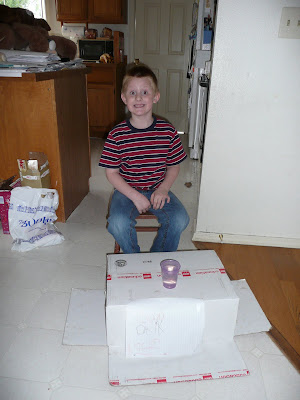Making Money
Some people are born entrepreneurs, natural salespeople. You know the kind I mean -- the ones (like my father-in-law) who get bored in the summer, and where normal people go to the beach for the week, they start businesses for fun. The high schoolers who mow lawns and babysit like all the other kids, but then invest in stocks and bonds and put themselves through college. The guys who could, with a smile and a joke, steal your car and sell it back to you -- and you'd think you got a good deal.
I am not one of them. I can manage the money I have, save it and invest it and spend it wisely, but I am not one of those people who says, "Hey, let's [fill in the blank]" and the air is suddenly full of dollar signs. Whether my children take after me or their grandpa, though, I feel it's important that they understand how money works, and have some of their own to manage. They each get a small weekly allowance that is not tied to chores, and from that they are expected to put 10% in the bank each month, and 10% into the church offering or another charity. The rest is theirs to save for toys and games, and up until recently that worked out pretty well.
And then there was Lego. Lots of Legos, actually. Hundreds. Thousands. Car Legos, spaceship Legos, airplane Legos, Star Wars Legos, and most of all, Indiana Jones Legos. It starts out small, the little kit with the Indiana Jones guy and his little car and his little hat and his little whip. And on the back of the instruction sheet, there is a picture of a bigger Indiana Jones kit, with a sidekick who comes with his own little hat, and a tower and a boat and a snake to scare Indiana Jones with. And do you know what comes on the back of that instruction sheet? Oh yes. The MOTHER of all Indiana Jones Lego kits. It has 554 pieces, two 75-page books of illustrated instructions, six spiders, eight snakes, a plane, two skeletons, three working traps, a golden skull, and (this always feels vaguely heretical) a little plastic Ark of the Covenant.
It costs eighty bucks. So you can imagine that the kit advertised on the back of that instruction manual was not within the price range of someone who makes $3.20 a month, after giving and savings. Peter therefore took matters into his own hands. He asked for paper, a pen, a cup, some tape, a big cardboard box ("No, Mom, BIGGER!"), and refused to answer any questions about his business plan. Fifteen minutes later, he set up shop:

A closer look at the sign:
Not just any drik, it's good drik. He was open and ready for business, and since he'd chosen the kitchen floor for his grand opening, it was pretty obvious who his target market was. He set it all up, his box and his sign and his plastic cup of lukewarm water, and gazed hopefully up at me. To his disappointment, he learned some important early lessons about pricing and marketing when I didn't pony up the anticipated $76.27.
When that didn't work, we tried the more mundane approach of household chores. We would agree on a service and Peter's fee, he would do the work, I would pay him, and his amused and generous Mama Kate would match his earnings with her own donation. He liked the idea of getting money from Mom and Grandma, but the reality of actually picking up sticks, cleaning under his bed, and sweeping up leaves proved to be daunting.
His latest moneymaking venture arrived in a black construction paper "envelope", carefully folded and taped around a yellow construction paper letter. He had dictated it to an aide in his first-grade class, and signed it in red marker. It reads:
Dear Mom,
I like you because you're good. And that's very kind of you. And it would be very sweet if you would just give me $1,050,001.00.
Your son,
Peter
It was certainly worth a try, and if nothing else I got a good laugh out of it. Even with the transparent attempt to cloak his financial scheme in filial love, I was proud of his focused efforts to bring in a few more bucks toward the next box of tiny pieces of plastic joy. And in today's economy, I fully understand the exasperation of watching the slow, slow growth of a pile of dollar bills toward something you really want.
Now that I stop and think about it, though, stranger business plans have worked. Any number of now-successful businessmen were laughed out of the first ten (or hundred) offices in which they pitched their products, before finding ultimate success. Maybe he's onto something:
"Dear IRS,
I like you because you're very big and strong. And that's very kind of you. And it would be very sweet of you if you would just give me ..."

